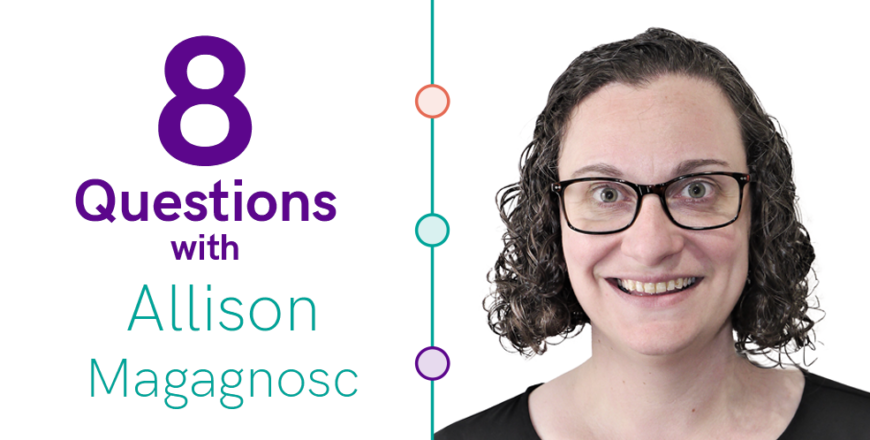
8 Questions with Allison Magagnosc
In “8 Questions With…,” we share a brief Q&A with a staff member. In this edition, we hear from Allison Magagnosc, who joined Rosov Consulting as a Senior Project Associate in 2021, bringing expertise in education evaluation.
1. What’s your area(s) of expertise and how has it been beneficial and led to success in your work?
I begin with the end in mind and apply that expertise at Rosov Consulting. When designing surveys and preparing for analysis, I start with what our client-partners want to understand, then craft survey questions and select appropriate analytical techniques that will provide insightful and meaningful answers. When preparing for a data presentation and trainings on evaluation best-practices for client-partners, I start with the goals for the session and craft experiences that will get the audience to realize those goals.
2. What experiences have led you into your current career path?
I started my career as a public school elementary educator where I gained experience in asking questions, building relationships, and being patient. After leaving the classroom, I worked for a nonprofit that conducted research and evaluation about teacher professional development and pre-service teacher education programs. This is where I first began flexing my evaluation muscles. Before joining Rosov Consulting, I served as an internal program evaluator for a nonprofit that worked to ensure everyone lived in a safe and healthy home. This experience shed light on the data culture within an organization and what challenges and success they encounter.
3. What do you like learning about most through your work?
I like learning about the impactful work our clients do and the innovative ways they seek to improve the Jewish community, as well as how others think about and engage Jewishly. I also enjoy learning about new and better techniques for conducting research and evaluation.
4. What do you like most about working at Rosov Consulting?
First, I like that we get to ask and answer interesting and important questions that help improve our clients’ work and the Jewish community more broadly. Secondly, I like that I get to do this work alongside smart and passionate colleagues.
5. What are some challenges of your work?
One of the biggest challenges is balancing the desire to answer ambitious questions with reliable and user-friendly data collection methods. Our clients often ask us to investigate complex ideas that result in lengthy surveys. With competing demands, it is challenging to ask respondents to take the time to complete long questionnaires.
6. What have been the biggest changes in the field and/or your work specifically since you started?
One of the biggest changes I have noticed recently is the focus and inclusion of the voices and lived experiences of participants into all steps in the evaluation process. The field is prioritizing and finding innovative ways to include program beneficiaries in the design, data collection, analysis, reporting, and meaning-making processes.
7. How do you think your job and/or the field might change in the next 10 years?
I think over the next 10 years, collecting data will become more challenging. I predict there will be more regulations around the collection and use of data, including an increase in the need to be more transparent about the process and respondents’ ability to control what and how their data is being used. I also think people will be more hesitant to share information about themselves and will want to ensure we maintain the highest levels of data security.
8. What do you think is essential reading to excel in your field?
A little bit of everything. There are always new techniques and programs that improve how we collect, analyze, and present information, so it is important to read what is being published by the American Evaluation Association and other similar technical experts. I also think it is important to read about current events so you can understand what may influence how people respond to data collection activities and how finding may (or may not) fit into the broader context.




